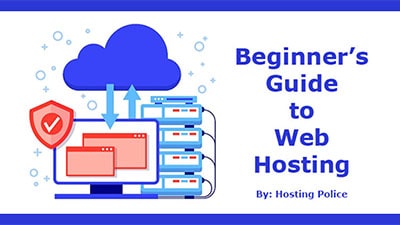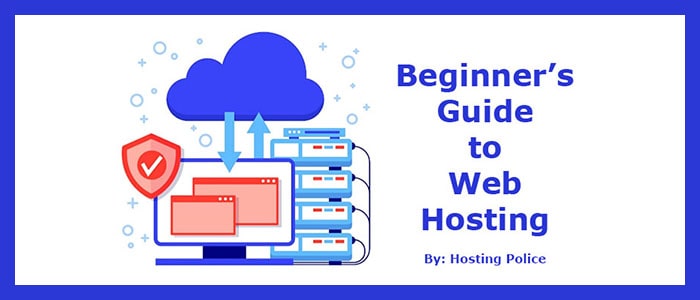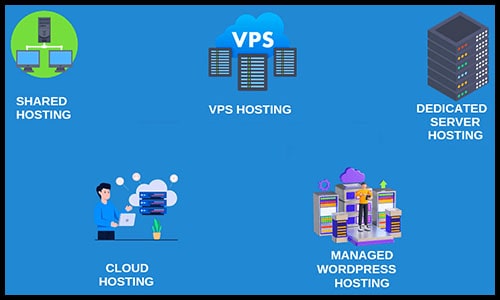A Beginner’s Guide to Web Hosting: All You Need to Know

If you are thinking about starting your first website then one of the most important decisions you will have to make is choosing the right web hosting service provider for your new website.
Without hosting, your website simply can’t exist online. Web hosting is the service that allows your website to be accessible to users via the internet. It’s like renting space on a server where all the files, images, and data that make up your website are stored and served to visitors.
If you’re a beginner, the world of web hosting can seem a little daunting, or intimidating, but it doesn’t have to be.
In this comprehensive guide, we’ll walk you through everything you need to know about web hosting. By the end of this article you’ll be ready to choose the best hosting plan for your website and have a solid understanding of how it all works.
1. What is Web Hosting?
At its most basic, web hosting is a service that allows individuals or organizations to publish a website onto the internet. When you sign up for a hosting service, you rent space on a server, which is a powerful computer that stores your website’s files and makes them accessible to people browsing the web.
Without hosting, your website wouldn’t exist online because there would be no place to store all the images, videos, text, and other content that makes up your site. Hosting providers maintain large networks of servers that keep your website running smoothly, offering the infrastructure and support needed to keep your site online 24/7.
2. Types of Web Hosting
There are several different types of web hosting available, each designed for specific needs.
Here are the most common types of hosting you’ll encounter:
Shared Web Hosting
Shared web hosting is the most popular as well as the most affordable option for website beginners and smaller websites. With shared hosting, multiple websites share a single server’s resources such as bandwidth and storage.
While this type of service helps reduce operating costs, it also means your website could potentially be affected by the performance and resource usage of other websites on the same shared server.
Pros:
Low-cost (typically $2–$10 per month)
Easy to set up and manage
Can include essential features like email accounts and SSL certificates
Cons:
Limited resources (e.g., CPU, RAM, bandwidth, storage)
Can be slower due to the shared environment
Less control over server settings
VPS Hosting (Virtual Private Server)
VPS hosting offers a step up from shared hosting by providing a virtualized server environment. Even though you share a physical server with other websites, your website is allocated a specific portion of the server’s resources (CPU, RAM, storage).
This means that you will have more control and better website performance that is not affected by other users on the same web server.
Pros:
More server resources and more control over the service compared to shared web hosting
It can handle a higher amount of traffic than shared hosting
It is till more affordable than dedicated hosting
Cons:
Requires a little bit more technical knowledge
More expensive than shared hosting
Dedicated Hosting
With dedicated hosting, you rent an entire physical server dedicated to your website alone. This will give you complete control over the server and all of its resources, which is ideal for higher-traffic websites or sites that require a higher level of security.
Pros:
Full control over the web server
Great for large, high-traffic websites
Higher performance and security
Cons:
Expensive (typically $100+ USD per month)
Requires technical expertise for server management
Cloud Hosting
Cloud hosting distributes your website’s data across multiple servers in multiple locations thus creating a more flexible and scalable hosting environment. If one server goes down, your site can still be served from another server thus ensuring a high uptime.
Pros:
Scalable and flexible
High reliability and uptime
Pay only for the resources you use / need
Cons:
Can become expensive as you scale up
Slightly more complex to manage
Managed WordPress Hosting
Managed WordPress web hosting is a type of web hosting service that is specifically tailored to WordPress websites and their specific needs.
The hosting service provider will manage all technical aspects including security, needed updates, and backups, leaving you free from these tasks and allowing you to focus on creating the content for your site.
Pros:
Optimized for WordPress performance
Automatic updates, backups, and security
Excellent customer support
Cons:
More expensive than standard shared hosting
Limited to WordPress sites only
3. What You Should Look for in a Web Hosting Service Provider
Choosing the right web hosting provider can be overwhelming with so many options out there.
Here are some important factors to consider:
Uptime Guarantee
Uptime refers to the amount of time that your website is accessible to potential visitors online. Ideally your web host should guarantee at least 99.9% uptime. Even a small amount of downtime can hurt your website’s credibility and search engine ranking.
Speed and Performance
Website speed is crucial for providing the best user experience and the best SEO. You should look for a hosting service provider that offers fast load times and has good performance. A slow website can lead to frustrated visitors that will leave your website and will result in lower search engine rankings for your site.
Security Features
Security is a top priority when choosing a web host. Make sure your hosting provider offers essential security features like SSL certificates, firewalls, DDoS protection, and regular data backups to protect your website from cyberattacks and data loss.
Customer Support
Reliable customer support is important, especially if you’re a website beginner. Choose a host that offers 24/7 support through multiple channels, such as live chat, email, support tickets or phone. Having access to helpful and knowledgeable support can save you time and frustration when problems arise.
Pricing and Renewal Rates
Many hosting providers offer low introductory prices, but renewal rates can be much higher. Always check the long-term pricing structure, including any renewal fees, to avoid unexpected price hikes when your contract renews.
Ease of Use
If you’re a beginner then you’ll want a hosting provider with an easy-to-use control panel, like cPanel or Plesk. These panels allow you to manage your all your website’s files, domains, and other settings without needing any advanced technical skills.
4. How to Choose the Right Web Hosting Plan for Your Needs
Choosing the right hosting plan depends on many different factors, including the size and the purpose of your website, what your budget is, and your technical expertise.
Here’s a quick and useful guide to help you decide what is right for your needs:
For Personal Blogs or Small Websites:
Shared hosting is a good option if you’re just starting out with a simple website or blog. It’s very affordable compared to other web hosting service types and easy to manage, making it perfect for beginners who don’t need a lot of server resources.
For Growing Websites or Small Business Sites:
If you anticipate growing traffic or want more control over your hosting environment then a VPS plan might be a good fit for you. It offers more resources and flexibility without the higher prices of dedicated hosting.
For High-Traffic Websites:
If your website experiences a lot of traffic or requires higher security, you might want to invest in a dedicated web hosting plan. This will give you more power and control over the server to ensure your website stays up and performs well.
For WordPress Sites:
If you’re using WordPress then managed WordPress hosting is often the best choice. It’s optimized for WordPress making it faster and easier to manage, especially for beginners.
5. How to Set Up Web Hosting
Once you have chosen a hosting plan, setting it up is usually a straightforward process. Most hosting providers offer one-click installations for popular content management systems like WordPress, Drupal, Joomla, Magento, etc…
Here is a general overview of all of the steps involved:
Sign Up for a Hosting Plan – Choose the hosting provider and plan that fits your needs, then sign up and complete the payment process.
Choose a Domain Name – If you don’t already have one, you’ll need to choose and register a domain name for your website (e.g., www.example.com).
Install Your Website – Many hosts offer one-click installations for WordPress and other CMS platforms. Alternatively, you can upload your website files via FTP or use a website builder.
Configure Your Settings – Customize your site settings through the control panel, including creating email accounts, setting up backups, and configuring your domain.
Launch Your Website – Once everything is set up then you are ready to launch your website and share it with the world!
Conclusion: Get Started with Confidence
Understanding web hosting is important for building and maintaining a successful website. Whether you’re starting a personal blog, an online store, or a business site, the right hosting provider and plan can make a big difference in your site’s performance, security, and overall success.
Having good web hosting can improve the user experience for your website users and helps the search engine optimization of your site.
By considering your specific needs, budget, and technical expertise, you can choose the perfect hosting solution and get your website online with confidence.
Remember, web hosting is not a “set it and forget it” service. You will need to monitor your site’s performance, ensure it’s secure, and adjust your hosting plan as your site grows. But with the right host, you will have a solid foundation to build your online presence and type of achieve your goals.
Happy web hosting!
(Disclaimer: Purchases through some links on our site may earn us an affiliate commission.)








